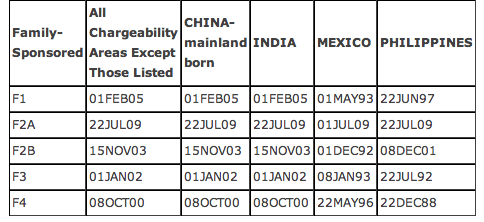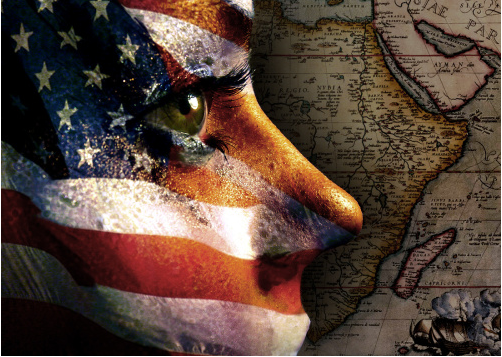March 2012 Visa Bulletin
The March 2012 Visa Bulletin has been published and we are seeing some movement.
The family-based chart:
 The employment-based chart:
The employment-based chart:
The March 2012 Visa Bulletin has been published and we are seeing some movement.
The family-based chart:
 The employment-based chart:
The employment-based chart:
 The issue of same-sex marriage is an important issue. Romben Law, APC gets questions all the time at our offices in Los Angeles and Palm Springs, and throughout the nation from US citizens who wish to immigrate a same-sex spouse. The Los Angeles Times is reporting that the US Court of Appeals for the Ninth Circuit in San Francisco, California will release its decision regarding the constitutionality of Marriage Equality and Proposition 8 on Tuesday, 7 February 2012 at 10:00 a.m. (PST).
The issue of same-sex marriage is an important issue. Romben Law, APC gets questions all the time at our offices in Los Angeles and Palm Springs, and throughout the nation from US citizens who wish to immigrate a same-sex spouse. The Los Angeles Times is reporting that the US Court of Appeals for the Ninth Circuit in San Francisco, California will release its decision regarding the constitutionality of Marriage Equality and Proposition 8 on Tuesday, 7 February 2012 at 10:00 a.m. (PST).
at Romben Law, APC, we are counseling our clients that whether the decision is a positive one or not, couples should not submit I-130 Family Petitions and I-485 Applications for Adjustment of Status based on a same-sex marriage without first consulting with an immigration attorney experienced in working with non-traditional families. –jcf
 The Obama Administration has proposed a change in immigration regulations which would potentially change the lives of undocumented immigrants in the USA.
The Obama Administration has proposed a change in immigration regulations which would potentially change the lives of undocumented immigrants in the USA.
Maybe the most common problem we see as immigration lawyers is the person who entered the USA with no documentation, or who had a visa but overstayed — the so-called “undocumented alien.” This problem is enormous and affects our clients throughout the nation, not only those at our Romben Law, APC offices in Los Angeles or Palm Springs.
This is very complicated, so please read carefully:
 Lately, the attorneys at Romben Law, APC have been fielding a number of inquiries from families about what to do when their petitioner passes away. These inquiries have been especially common from our offices in Los Angeles and Palm Springs. Clients will usually ask if there is a way that they can obtain a substitute sponsor. This is known as requesting “humanitarian reinstatement” of the petition from the U.S. Citizenship & Immigration Services, or USCIS.
Lately, the attorneys at Romben Law, APC have been fielding a number of inquiries from families about what to do when their petitioner passes away. These inquiries have been especially common from our offices in Los Angeles and Palm Springs. Clients will usually ask if there is a way that they can obtain a substitute sponsor. This is known as requesting “humanitarian reinstatement” of the petition from the U.S. Citizenship & Immigration Services, or USCIS.
For example, a father became a naturalized citizen in 1996 and then immediately filed a petition for his adult son in the Philippines. Although the petition was quickly approved, the priority date would not become current for many years due to the backlog and demand for visas. This delay is due to the Priority Date system used by USCIS and Department of State to determine who is next-in-line. Unfortunately, during the waiting period, the father passed away. Under current regulations, an approved petition is automatically revoked upon the death of the petitioner. The surviving members of the family reside in the United States. Certain members of the family would be eligible to be the substitute sponsor for purposes of the affidavit of support, but the first step would be to request that USCIS reinstate the petition.
In order to do so, USCIS considers the following factors:
 Today the world mourns Steve Jobs. Steve Jobs was the creator and visionary at Apple, Inc. but he is remembered as one of the world’s greatest business leaders, ranking up there with the likes of Ford and Rockefeller. Steve Jobs was credited for bringing technology and it’s benefits to the every day lives of every day people. The attorneys at Romben Law, APC want to thank Steve Jobs for changing how we think about technology, for inspiring us to think creatively in what we do as immigration attorneys.
Today the world mourns Steve Jobs. Steve Jobs was the creator and visionary at Apple, Inc. but he is remembered as one of the world’s greatest business leaders, ranking up there with the likes of Ford and Rockefeller. Steve Jobs was credited for bringing technology and it’s benefits to the every day lives of every day people. The attorneys at Romben Law, APC want to thank Steve Jobs for changing how we think about technology, for inspiring us to think creatively in what we do as immigration attorneys.
Romben Law, APC is proud to run our office on Apple technology. We love our Apple computers, iPhones and iPads. But more importantly, the immigration attorneys at Romben Law, APC have also embraced the entrepreneurial spirit and determination which is best exemplified by Steve Job’s own words:
Your work is going to fill a large part of your life, and the only way to be truly satisfied is to do what you believe is great work. And the only way to do great work is to love what you do.
 Following this past year’s diversity lottery fiasco, the US Department of State has announced that it will begin accepting applications for DV 2013 at noon (EDT) on October 4, 2011. The application period will close on November 4, 2011 at noon (EDT).
Following this past year’s diversity lottery fiasco, the US Department of State has announced that it will begin accepting applications for DV 2013 at noon (EDT) on October 4, 2011. The application period will close on November 4, 2011 at noon (EDT).
It has only been a few months since Dept of State notified then revoked the winning results of 22,000 “winning” lottery applicants. In the incident, now commonly known as “22,000 tears,” the DOS reported that a computer glitch caused 90% of the DV2012 winners to be selected from applications made during the first 2 days of the 30-day application period, and that because of this, the results were not “randomized,” and hence, invalid. DOS states that it “mistakenly informed” these unfortunate 22,000 “winners,” some of whom had already started making plans and selling off assets to move to the US and begin their American Dream.
As we look ahead, some changes have been made to the countries whose nationals can now participate in the DV 2013 lottery. Nationals of South Sudan and Poland are now eligible to submit applications and although mainland Chinese born applicants cannot participate, Hong Kong SAR, Macau, and Taiwanese applicants may still apply. While the Los Angeles visa attorneys at Romben Law, APC, wish the best of luck to all DV 2013 applicants, we also remember and sympathize with the 22,000 individuals of DV 2012. –ecf
 Congratulations to the citizens of New York for the practical and humane approach taken by their Legislature and Governor in the approval of same-sex marriage last week! As leading advocates for immigrants in the gay and lesbian community, the attorneys at Los Angeles’ Romben Law, APC have counseled thousands of clients from all over the nation and the world about uniting families which are not traditionally shaped.
Congratulations to the citizens of New York for the practical and humane approach taken by their Legislature and Governor in the approval of same-sex marriage last week! As leading advocates for immigrants in the gay and lesbian community, the attorneys at Los Angeles’ Romben Law, APC have counseled thousands of clients from all over the nation and the world about uniting families which are not traditionally shaped.
Beware! It is still NOT possible for same-sex couples to marry and to have the US citizen spouse petition for legal permanent resident status (the so-called green card) for the foreign spouse. This prohibition applies even when the couple both marries and resides in New York.
A same-sex marriage in New York (or from any other state or country, for that matter) will not be recognized for purposes of Federal immigration benefits. This includes Family Petitions for alien spouses, and also includes spouse-as-dependent on any other residency application. The culprit here is the Federal Defense of Marriage Act (DOMA).
 Beginning 15 August 2011, US Citizenship and Immigration Services (USCIS) will change the way I-130 Petition for Alien Relative is filed. Although Romben Law, APC are an immigration law firm in Los Angeles, we represent clients on every continent of the globe (except Antarctica), and we have filed I-130 Petitions all over the world.
Beginning 15 August 2011, US Citizenship and Immigration Services (USCIS) will change the way I-130 Petition for Alien Relative is filed. Although Romben Law, APC are an immigration law firm in Los Angeles, we represent clients on every continent of the globe (except Antarctica), and we have filed I-130 Petitions all over the world.
Beginning on 15 August, I-130s from Petitioners living outside the USA may be filed at the USCIS Chicago Lockbox facility. Petitioners who live outside the USA in a country where there is a USCIS office still have the option to file the I-130 at that USCIS office. –jcf
** You are a US citizen, and you have petitioned your brother from China.
** You are a US legal permanent resident, and you have petitioned your adult, unmarried daughter from Egypt.
** You are a US citizen, and you have petitioned your married son from Argentina.
“When is my relative going to be able to immigrate to the USA. Why do we have to wait so long? I know my relative’s priority date, but the dates on the Visa Bulletin swing backwards and forwards. It makes no sense!”
Strangely enough, this is one of the MOST DIFFICULT things to ask an immigration lawyer. The immigration attorneys at Romben Law, APC in Los Angeles have decades of experience with the immigration system, and we still find it difficult to estimate the progress of the Visa Bulletin. We tell the client to look at the Visa Bulletin, to see which dates are being processed currently. The client calls us back and says, “the Visa Bulletin says that people in my relative’s category who applied in 2003 are being processed now! Does that mean my relative must wait another eight years? (Assume we are in the year 2011.) Well, maybe, and maybe not.
The movement of priority dates on the Visa Bulletin is vastly and famously difficult to predict. That is because guessing is difficult due to (a) the total number of visas available, (b) the number of visas permitted to each country of the world, (c) the number of visas taken up by each petition, and (d) the time of year.
There are some technical, extremely detailed explanations about how the Visa Bulletin works. If you would like to read one — and if you think it will help — click here. I have read a number of these explanations, and to be honest, after 30 years of practicing law, the system is as opaque as ever. In practice, this is the way I explain the movement of priority dates when my clients ask me:
First, the US Congress has limited the maximum number of family-based immigrant visas (green cards) that can be granted each year to 480,000. (There are exceptions to this, but they are not relevant to this discussion.) Of the 480,000, maximums are set for the visas available in each family-based category: son or daughter of a US citizen, spouse or minor child of a legal permanent resident, unmarried son or daughter of a legal permanent resident, married son or daughter of a US citizen, and sibling of a US citizen.
Why 480,000? It is a figure set by Congressional act and is based, at least in part, on the Congressional judgment of the number of immigrants that the USA can reasonably absorb in any one year.
Further: nationals of any one country of the world may not receive more than a maximum of 25,000 annually. This does not mean that all 25,000 will be given out for each country, but it sets the maximum.
Why 25,000? Again, this number is set by Congress, and it reflects the desire not to have too many immigrants from any one single country arrive in one year, creating an unbalanced demographic picture.
This means that a low-demand country, say, Monaco or Vanuatu, would probably not use up its allotment of 25,000, across all the family-based visa categories. However, a high-demand country, say, China or the Philippines, would have more than 25,000 people who want to immigrate to the USA in any given year. However, even if Monaco does not use up its 25,000 visa allotment, China does not get to have more than the maximum 25,000 visas as a result!
Second, each petition can account for more than one beneficiary. For example, let’s pretend that Mr. Smith, from the United Kingdom, is married with two minor children. Mr. Smith’s brother is an American citizen, and Brother files an I-130 Family Petition for Mr. Smith. So: when Mr. Smith immigrates, the one petition will end up using up four green cards: one for Mr. Smith, one for Mr. Smith’s wife, and two for each of Mr. Smith’s minor children.
US immigration counts petitions not beneficiaries. This makes estimates VERY difficult.
Third, the US fiscal year begins on 1 October. It is on this date that the “new” batch of 480,000 green cards (immigrant visas) hits the system. This means that ANY of the unused visas for the fiscal year that just ended die — although there are RARELY any of the 480,000 visas which go unused, given the high demand. The new fiscal year means a brand-new start with 480,000 family-based visas.
As a practical matter, this means that US consulates begin processing many, many green cards at the beginning of the fiscal year — October, November, December, and January. When this happens, the priority dates begin to move rapidly. People look on the monthly Visa Bulletin issued by the Department of State, and they see the priority dates moving like lightning. People say to themselves, “My god: the priority date is jumping 8-9 months every calendar month! I will get to immigrate soon!!!”
Then in February, March, and April, as the fiscal year moves on, the movement in the processing dates begins to slow to a crawl, because consular officers get cautious about processing people when there may not be enough visas to last until 30 September, to the end of the fiscal year. Finally, in July, August, and September, the numbers stop advancing and SOMETIMES they retrogress.
My advice to any one who is waiting for the arrival of a priority date: regularly watch the State Department’s Visa Bulletin, which comes out on the 15th of each calendar month. This will provide you with a better idea of how the priority date is advancing. –jcf
 President Obama addressed the nation in a highly anticipated speech on immigration reform from El Paso, Texas. Many have criticized the President’s speech because he offered little in detail but spoke in broad terms.
President Obama addressed the nation in a highly anticipated speech on immigration reform from El Paso, Texas. Many have criticized the President’s speech because he offered little in detail but spoke in broad terms.
The immigration attorneys at Romben Law, APC would like to note that while deportations have increased under the Obama administration, President Obama reiterated that legalization should be offered to the undocumented, but with an emphasis on accountability. The President stated clearly: “those who are here illegally have a responsibility as well … they have to admit that they broke the law, pay their taxes, pay a fine, and learn English. And they have to undergo background checks and a lengthy process before they can get in line for legalization.”
The President also weighed in on the hallmark of immigration: family reunification. President Obama said “I don’t believe the United States of America should be in the business of separating families. That’s not right. That’s not who we are.”